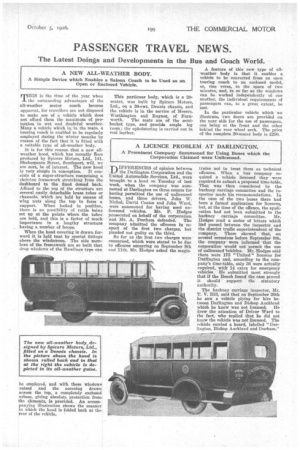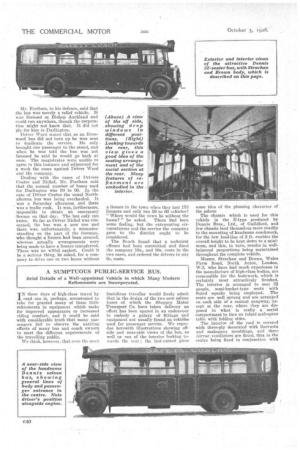A LICENCE PROBLEM AT DARLINGTON.
Page 61

Page 62

If you've noticed an error in this article please click here to report it so we can fix it.
A Prominent Company Summoned for Using Buses which the Corporation Claimed were Unlicensed.
DIFFERENCES of opinion between the Darlington Corporation and the United Automobile Services, Ltd., were brought to a head on Tuesday of last week, when the company was summoned at Darlington on three counts for having permitted the use of unlicensed buses, and three drivers, John W. Nichol, David Coates and John Ward, were summoned for having used unlicensed vehicles. Mr. P. Hodges prosecuted on behalf of the corporation 'and Mr. A. Feetham defended. The oompany admitted the offences in respect of the first two charges, but pleaded not guilty on the third.
So far as the first two charges were concerned, which were stated to be due to offences occurring on September 9th and 11th, Mr. Hodges asked the magis
trates not to treat them as technical offences. When a bus company required a vehicle licensed they were required to submit a proposed time-table. That was then considered by the hackney carriage committee and the inspector made his recommendations. In the case of the two buses there had been a formal application for licences, but, at the time of the offence, the application had not been submitted to the hackney carriage committee. Mr. Hodges read a series of letters which lead passed between the inspector and the district traffic superintendent of the company. These showed that, an several occasions before September 9th, the company were informed that the corporation would not permit the use of unlicensed Vehicles. Mr. Hodges said there were 173 "United" licences for Darlington and, according to the company's time-table, only 36 were actually required, with 14 extra for emergency vehicles. He submitted most strongly that if the Bench found the case proved it should support the statutory authority.
The hackney carriage inspector, Mr. T. V. Hill, said that on September 20th he saw a vehicle plying for hire between Darlington and Bishop Auckland which he knew was not licensed. He drew the attention of Driver Ward to the fact, who replied that he did not know the vehicle was not licensed. The vehicle carried a board, labelled "Darlington, Bishop Auckland and Durham."
Mr. Feetham, in his defence, said that the bus was merely a relief vehicle. It was licensed at Bishop Auckland and could run anywhere, though the corporation might not know that. It did not ply for hire in Darlington.
Driver Ward stated that as an Evenwood bus did not turn up he was sent to duplicate the service. He only. brought one passenger to the stand, and when he was told the bus was not licensed he said he would go back at once. The magistrates were unable to agree in this instance and adjourned for a week the cases against Driver Ward and the company.
Dealing with the cases of Drivers Coates and Nichol, Mr. Feetham said that the normal number of buses used for Darlington was 50 to 60. In the case of Driver Coates the -usual Northallerton bus was being overhauled. It was a Saturday afternoon and there was a traffic rush. It was, furthermore, impossible to obtain an emergency -licence on that day. The bus only ran twice. So far as Driver Nichol was concerned, the bus was a new one and there was, unfortunately, a misunderstanding on the part of the foreman, who thought a licence had been secured, whereas actually arrangements were being made to have a licence transferred. There was no wilful neglect. Could it be a serious thing, he asked, for a company to drive one or two buses without a licence in the town when they had 173 licences and only ran 50 to 60 vehicles? "Where would the town be without the buses?" he asked. There had been some feeling, but the extenuating circumstances and the service the company gave to the district ought to be considered.
The Bench found that a technical effence had been committed and fined the company 10s., and 10s. costs in the two eases, and ordered the drivers to pay 6.s., costs.












































































































